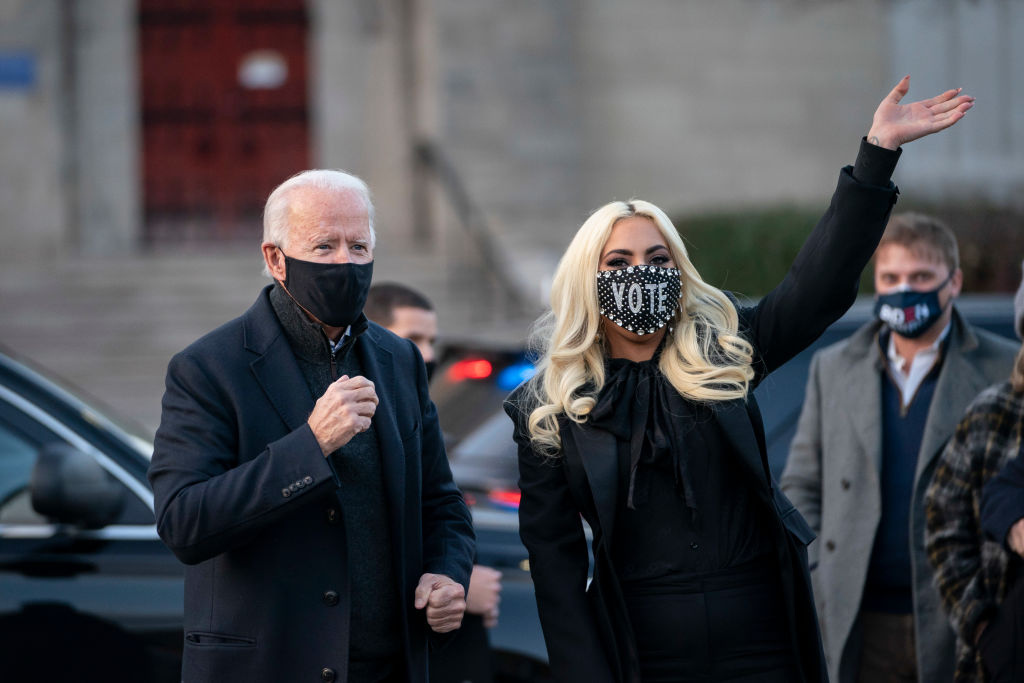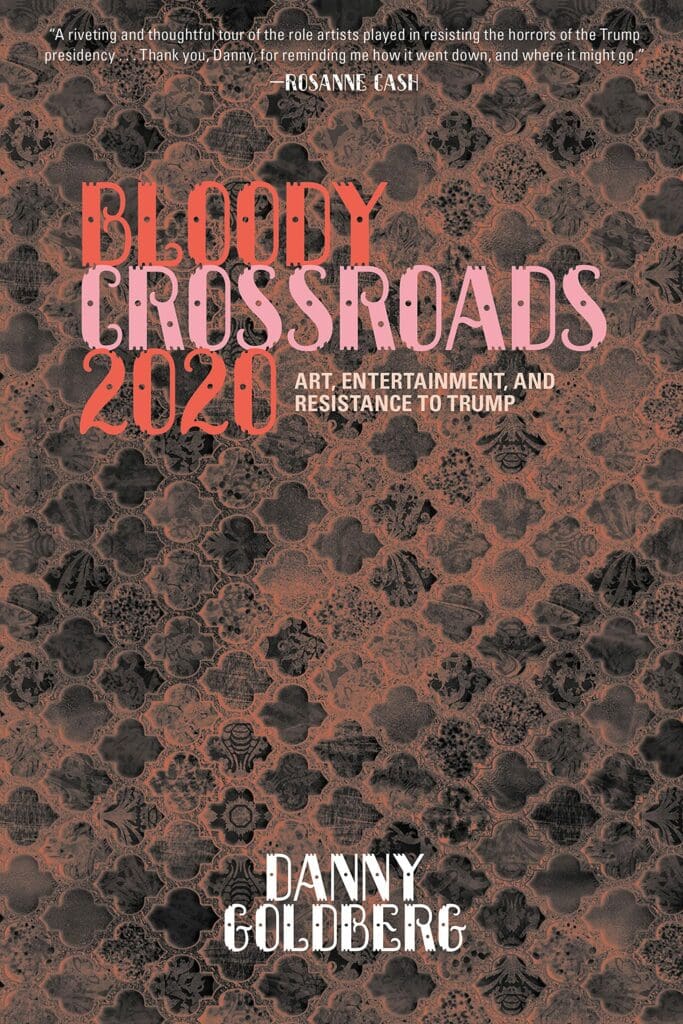Culture & Media
The Politics in Our Stars
Nirvana manager-turned-activist Danny Goldberg shares lessons from the intersection of celebrity and the 2020 presidential campaign.

With hotly contested midterm elections looming in November, a crucial question comes to mind: What can we learn from the 2020 presidential election, which came at a time when Americans were particularly politically engaged, due largely to social media?
After all, the debate over that presidential vote raged online in the run-up to Election Day, and for months afterward. (For some die-hard Trump supporters, it still does.) Everyone from your distant cousin in Michigan and a crack addict-turned-pillow salesman to celebrities from Ben Affleck to Zendaya weighed in.

Danny Goldberg. Photo courtesy Akashic Books.
Influential music journalist-turned-band manager-turned industry executive Danny Goldberg explores some of the numerous instances of entertainers speaking out on the presidential race and that tumultuous year of viral tweets and other postings in his new book, Bloody Crossroads 2020: Art, Entertainment, and Resistance to Trump.
Goldberg is well aware of the interrelationship between politics and such stars. In his half-century in the music business — as a journalist (Rolling Stone, The Village Voice, The Nation), record company president, and band manager (Nirvana, Sonic Youth), Goldberg has leaned into progressive issues, as when he co-produced and co-directed the rock documentary No Nukes in 1980 and became a fixture in Democratic politics, while also writing for The Nation and becoming an author. Goldberg spoke to Capital & Main about what we can learn from the presidential election and celebrity activism to understand our political future.
Note: This interview has been edited for length and clarity.
Capital & Main: What inspired you to write this book?
Danny Goldberg: I’ve had a long interest in the relationship between artists and politics. I’ve often thought that the political media — especially the non-right-wing political media — tended to trivialize it in a way that wasn’t helpful to the progressive cause.
I also felt that the right wing, while trying to kind of gaslight Democrats and liberals into staying away from the world of entertainment, knew how valuable it was. Hence, Reagan as governor of California and then president. But Trump took it to a whole other level. He was only president because he’d hosted a reality TV show for 14 years in primetime. He had branded himself in the minds of tens of millions of Americans as this brilliant businessperson. And people in the entertainment business knew then — and know now — that reality television has little to do with actual reality.
I noticed that there was this explosion of a much wider and more diverse group of people in the creative community speaking out after Trump got elected. And I thought it would be interesting to try to document the role that they played in the election.
 In the book you document Hollywood’s history of activism. But it’s intensified in recent years. Why do you think that is?
In the book you document Hollywood’s history of activism. But it’s intensified in recent years. Why do you think that is?
We are living, for better or for worse, in this world where social media is very important, where general old-school media is diminished in its reach. And the other side has invested an enormous amount in this. On any given day, look at the top 10 Facebook posts. It’s usually somebody like Ben Shapiro or Dinesh D’Souza. It skews to the right. And they have Fox News. They have AM talk radio. They have these other television networks that are even to the right of Fox, speaking in a populist language, repeating over and over their version of reality. Speeches on the floor of the Senate and op-ed pieces in the New York Times and NPR are not going to reach enough people to fight back. You also need populist messengers.
There has been the perception over the years that whenever entertainers speak out politically, they, in fact, have the opposite effect of what they’re trying to accomplish. Some conservatives contend that people in the “flyover states” don’t like liberal elites telling them what to do. Do you think this is true?
There’s sort of two categories of people who criticize or belittle the role of artists and entertainers in political conversations. One category is people who are on the opposite side ideologically. So Laura Ingraham writes the book “Shut Up and Sing,” but I don’t think she wanted Kid Rock to shut up and sing, or Jon Voight to shut up and act, or Donald Trump to shut up and go back to reality television.
I think the right is threatened by [Hollywood activism] because they recognize there’s this populist current that entertainers can create that reaches people who op-ed writers don’t reach. And I think that’s why they demonize entertainers so much.
And then there’s the phenomenon of kind of a liberal condescension towards entertainers. I think there’s a certain amount of territoriality among some of the pundits. People who studied policy their whole life have pride about their expertise, and yet, Meryl Streep says something about insecticides, and it gets more attention.
“I think the right is threatened by Hollywood activism because they recognize there’s this populist current that entertainers can create that reaches people who op-ed writers don’t reach.”
And the role of artists in politics is not limited to endorsements. If anything, a larger role historically has been when their art is connected to issues. I don’t think that the reaction among younger white people to the murder of George Floyd would’ve been as intense if it weren’t for a couple of decades of hip-hop lyrics sensitizing white hip-hop fans to the problem of racist policing.
I don’t think that gay marriage would’ve become so widely popular [without depictions in movies and TV shows]. During the Clinton years, [supporting gay marriage] was a surefire way for Democrats to lose. And by the time Obama was running for reelection, over 60% of Americans supported gay marriage, and it was a liability to be homophobic.
Do you think the increase in political activism among entertainers will continue?
I think for some time to come the creative community is going to have a louder voice going forward than they did in the pre-Trump years. I think once you’ve crossed the bridge and decided you’re going to weigh in on what your political beliefs are, it usually feels pretty good to most people. I spoke to Springsteen all during his 20s, and he never said one word politically. And then Jackson Browne asked him to do the No Nukes concerts in 1980. And that was the first political thing he did. And then from then on, for the last 40 years, he’s been constantly weighing in. Sean Penn once said [about activism], “Once it’s in your DNA, it doesn’t leave.”
Do you think the creative community helped swing the 2020 election?
I think they were part of it. I think putting Kamala Harris on a ticket was the right move. I think that the way Biden reached out to Bernie Sanders was very helpful in terms of motivating and making his voters feel comfortable supporting Biden. But they also had a celebrity host every single night of their convention. They had Brad Pitt narrating one of Biden’s commercials, Springsteen narrating another. They must have thought there was some reason to use those people.
“Politicians operate within a very narrow range of conversation, and that narrowness can sometimes be exploited by some of the darkest forces.”
The book is an exhaustive chronicle of entertainment activism, but you shy away from any analysis. Why is that?
I just think to deny that [celebrity activism] was part of the mix to me is not rational, but to try to measure the precise effect of it, I think, would be ridiculous. I just don’t trust anybody who says they know why somebody votes one way or the other. I think that’s pseudoscience. I think there are certain things that research can tell you. There are certain things that focus groups can tell you. There are certain things that polls can tell you. And there’s a lot that none of those things can tell you.
What’s the main message you want your readers to take away from this book?
Just to have a more open mind in thinking about what the American political conversation is, and to recognize that politicians must focus on the next election — what the polls say, what a focus group says, what their donors want. They operate within a very narrow range of conversation, and that narrowness can sometimes be exploited by some of the darkest forces.
And I think just widening consciousness allows for more oxygen in the conversation, more energy, less fear, less despair. I’m a big believer in more — more people involved, more energy. That should include artists. It should include young people. But if there had to be one message, it would be: We won.
Copyright 2022 Capital & Main

-

 Column - State of InequalityJanuary 22, 2026
Column - State of InequalityJanuary 22, 2026On Eve of Strike, Kaiser Nurses Sound Alarm on Patient Care
-

 The SlickJanuary 20, 2026
The SlickJanuary 20, 2026The Rio Grande Was Once an Inviting River. It’s Now a Militarized Border.
-

 Latest NewsJanuary 21, 2026
Latest NewsJanuary 21, 2026Honduran Grandfather Who Died in ICE Custody Told Family He’d Felt Ill For Weeks
-

 The SlickJanuary 19, 2026
The SlickJanuary 19, 2026Seven Years on, New Mexico Still Hasn’t Codified Governor’s Climate Goals
-

 Latest NewsJanuary 22, 2026
Latest NewsJanuary 22, 2026‘A Fraudulent Scheme’: New Mexico Sues Texas Oil Companies for Walking Away From Their Leaking Wells
-

 The SlickJanuary 23, 2026
The SlickJanuary 23, 2026Yes, the Energy Transition Is Coming. But ‘Probably Not’ in Our Lifetime.
-

 The SlickJanuary 27, 2026
The SlickJanuary 27, 2026The One Big Beautiful Prediction: The Energy Transition Is Still Alive
-

 Column - State of InequalityJanuary 29, 2026
Column - State of InequalityJanuary 29, 2026Are California’s Billionaires Crying Wolf?

